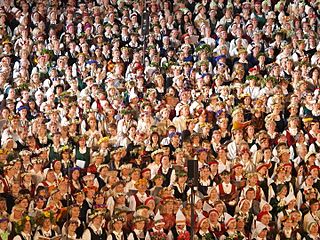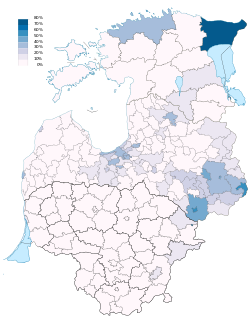Related Research Articles

Latvia, officially known as the Republic of Latvia, is a country in the Baltic region of Northern Europe, bordered by Estonia to the north, Lithuania to the south, Russia to the east, Belarus to the southeast, and sharing a maritime border with Sweden to the west. Latvia covers an area of 64,589 km2 (24,938 sq mi), with a population of 1.9 million. The country has a temperate seasonal climate. Its capital and largest city is Riga. Latvians belong to the ethno-linguistic group of the Balts; and speak Latvian. The term "Baltic countries" usually refers to the group of three countries: Lithuania, Latvia, and Estonia. However, Lithuanian and Latvian are the only two surviving Baltic languages.

This article is about the demographic features of the population of the historical territory of Latvia, including population density, ethnic background, education level, health of the populace, economic status, religious affiliations and other aspects of the population.

The politics of Latvia takes place in a framework of a parliamentary representative democratic republic, whereby the Prime Minister is the head of government, and of a multi-party system. The President holds a primarily ceremonial role as Head of State. Executive power is exercised by the government. Legislative power is vested in both the government and parliament, the Saeima. The Judiciary is independent of the executive and the legislature. The Economist Intelligence Unit rated Latvia a "flawed democracy" in 2019.
Jus sanguinis is a principle of nationality law by which citizenship is determined or acquired by the nationality or ethnicity of one or both parents. Children at birth may be citizens of a particular state if either or both of their parents have citizenship of that state. It may also apply to national identities of ethnic, cultural, or other origins. Citizenship can also apply to children whose parents belong to a diaspora and were not themselves citizens of the state conferring citizenship. This principle contrasts with jus soli, which is solely based on the place of birth.

Latvians are a Baltic ethnic group and nation native to Latvia and the immediate geographical region, the Baltics. They are occasionally also referred to as Letts, although this term is becoming obsolete. Latvians share a common Latvian language, culture and history.
In international law, a stateless person is someone who is "not considered as a national by any state under the operation of its law". Some stateless people are also refugees. However, not all refugees are stateless, and many people who are stateless have never crossed an international border. On November 12, 2018, the United Nations High Commissioner for Refugees stated there are about 12 million stateless people in the world.

Russians in the Baltic states describes self-identifying ethnic Russians and other primary Russian-speaking communities in Estonia, Latvia, and Lithuania, commonly referred to collectively as the Baltic states. In 2017, there were 1 million ethnic Russians in the Baltic States, having declined from 1.7 million in 1989, the year of the last census during the Soviet era.

This article details the geographical distribution of Russian-speakers. After the dissolution of the Soviet Union in 1991, the status of the Russian language often became a matter of controversy. Some Post-Soviet states adopted policies of de-Russification aimed at reversing former trends at Russification.
Russians in Latvia have been the largest ethnic minority in the country for the last two centuries. The number of Russians in Latvia more than quadrupled during the Soviet occupation of Latvia when the size of the community grew from 8.8% of the total population in 1935 (206,499) to 34.0% in 1989 (905,515). It started to decrease in size again after Latvia regained independence in 1991 falling to 25.2% at the beginning of 2018.
Latvian Americans are Americans who are of Latvian ancestry. According to the 2008 American Community Survey, there are 93,498 Americans of full or partial Latvian descent.
Ethnic democracy is a political system that combines a structured ethnic dominance with democratic, political and civil rights for all. Both the dominant ethnic group and the minority ethnic groups have citizenship and are able to fully participate in the political process. Ethnic democracy differs from ethnocracy in that elements of it are more purely democratic. It provides the non-core groups with more political participation, influence and improvement of status than ethnocracy supposedly does. Nor is an ethnic democracy a Herrenvolk democracy which is by definition a democracy officially limited to the core ethnic nation only.

All For Latvia! was a nationalist, right-wing political party in Latvia led by Raivis Dzintars and Imants Parādnieks. Formed in 2000, it entered a right-wing nationalist coalition in 2010, and ultimately merged with the For Fatherland and Freedom Party in 2011 to form the National Alliance.

Non-citizens or Aliens in Latvian law are individuals who are not citizens of Latvia or any other country, but who, in accordance with the Latvian law "Regarding the status of citizens of the former USSR who possess neither Latvian nor other citizenship", have the right to a non-citizen passport issued by the Latvian government as well as other specific rights. Approximately two thirds of them are ethnic Russians, followed by Belarusians, Ukrainians, Poles, and Lithuanians.

The Latvian nationality law is based on the Citizenship Law of 1994. It is primarily based on jus sanguinis.

Abkhazia, officially the Republic of Abkhazia, is a partially recognized separatist state in the South Caucasus, recognised by most countries as part of Georgia, which views the region as an autonomous republic. It lies on the eastern coast of the Black Sea, south of the Greater Caucasus mountains in northwestern Georgia. It covers 8,665 square kilometres (3,346 sq mi) and has a population of around 245,000. Its capital is Sukhumi.
Human rights in Estonia are acknowledged as generally respected by the government. While there are concerns in some areas, such as detention conditions, police use of force, and child abuse, Estonia is ranked above-average in democracy, press freedom, privacy and human development. Individuals are guaranteed basic rights under the constitution, legislative acts, and treaties relating to human rights ratified by the Estonian government.

After the dissolution of the Soviet Union (USSR) in December 1991, about 25 million ethnic Russians in post-Soviet states found themselves living outside of Russia.
Multiple/dual citizenship is a legal status in which a person is concurrently regarded as a national or citizen of more than one country under the laws of those countries. Conceptually, citizenship is focused on the internal political life of the country and nationality is a matter of international dealings. There is no international convention which determines the nationality or citizenship status of a person. This is defined exclusively by national laws, which can vary and conflict with each other. Multiple citizenship arises because different countries use different, and not necessarily mutually exclusive, criteria for citizenship. Colloquially, people may "hold" multiple citizenship but, technically, each nation makes a claim that a particular person is considered its national.

Georgian nationality law is the law governing the acquisition, transmission and loss of Georgian citizenship.

The Progressives is a social-democratic political party in Latvia. The party was founded on February 25, 2017. Since September 4, 2021 its leaders have been Antoņina Ņenaševa and Atis Švinka. The Progressives currently do not hold any seats in the Saeima or European Parliament, but they have significant representation in the Riga City Council.
References
- ↑ Georgians in Latvia
- ↑ "Samšoblo Georgia". Archived from the original on 2009-08-11. Retrieved 2011-12-09.
- ↑ Georgian Embassy in Latvia
- ↑ "Georgia ready to receive ethnic Georgians denied Latvian citizenship". Prime-News news agency, Tbilisi. May 18, 2000. Retrieved January 25, 2012.